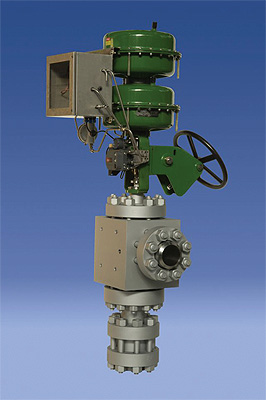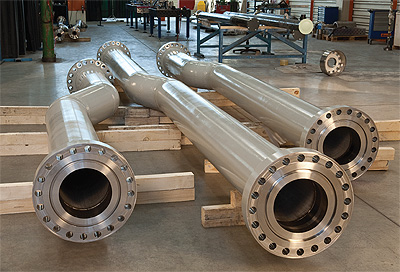
BHDT Navigates Oil Price Downturn with Technical Innovation and Strategic Expansion
Withstanding the pressure
When Energy, Oil & Gas last spoke with Manuel Prohaska, Head of Oil and Energy at BHDT, in January 2015, business was looking positive. For the latter half of 2014 orders for the company’s specialist high-pressure services, including flanges, spools and valves, had been strong and it had made significant headway in establishing an expert group for the development of high-pressure ball valves for the subsea market. A year on and BHDT has felt the full force of the crashing oil price and subsequent postponement of major projects. Despite this, Manuel remains positive and is confident in continuing the company’s technical development and expanding its presence within the market.

“Many of our systems are focused on the deepwater, high quality projects but these have been amongst the first cancellations within the industry,” he begins. “Much of our business over the lifetime of this department has been focused on the floating segment, for instance FPSOs and FLNGs, however significant development activity here has fallen to zero. This makes it a very challenging market to operate in at present.”
Previously, Manuel noted the successful completion of the FLNG Prelude project for Shell, BHDT’s first project supplying all of the inner piping, flanges, bolts and other associated equipment in the centre of the turret. He went on to say that a second project for Shell on the Browse FLNG programme was expected to start in 2015. Yet, as with many other major projects committed to by the company, this has now been postponed.
However, work still goes on for the Austrian firm. “It is still important for us to continue investing time and money into developing our technical capabilities and improving our quality so that we are prepared to act as soon as the oil price and demand in the market picks up again,” he continues. “Over the last 11 months we have remained focused on the development of high-pressure ball valves for subsea manifolds and we will very soon be entering into the prototype testing phase, so progress here is going well. Luckily we have secured some investment from the Austrian government to continue this work and we are confident that these technical solutions can be real game changers in this field.”
Taking these challenging times into consideration BHDT has grasped the opportunity to look beyond its strategic core in search for niche applications within the petrochemical industry where it can also deliver its expertise. A recent order for a custom-made flange solution for a revamp in a methanol plant was worth one million euros and provided good margins for the firm, and a spate of other smaller projects will help mitigate some of the affects from the oil and gas downturn. “The point is, we are solutions providers,” highlights Manuel. “We look for the problems our customers’ face and work out how we can fabricate specialist and high quality components to solve them. This creates an opportunity to look for different niche markets and potentially compensate for some of the losses we are experiencing from FPSO projects. Competition in this segment is much higher, but over the next couple of years we will look to deepen this effort before our core market recovers.”
The next step in gearing up for the market’s re-emergence is to increase the commercial activity and expand its sales network. BHDT recently employed two new sales managers to develop channels in the US and in Europe in order to start creating awareness and establishing a footing for these new developments in what is a relatively young department for the group. For much for the firm’s applications and specialities in niche markets, the BHDT name has been the go to for solutions. “As a company we have been part of these niche industries for many decades and our clients knew us so as soon as a new plant was planned anywhere in the world, we got enquiries,” explains Manuel. “This new business for new developments in the oil and gas industry is not necessarily like that so we have to make sure people know who we are and what we are doing.”
One of the key strengths of BHDT is its position in the supply chain, often directly below the major EPCs, offering comprehensive and integrated packages from spools to valves, with an engineering capability that extends from pipe cutting right the way through to coating. Work over the coming year or so will be key to expanding this complete package with new developments, but making sure these can be qualified and accepted by the market is the next challenge.
To overcome this, and as part of the company’s strategy to develop a robust sales network around the world, efforts are being made to establish lines of communication with potential clients to support the development of new technologies. However, with many EPCs going through restructuring processes amidst the oil price crisis, most remain closed off from exploring new opportunities with their suppliers. “We try to encourage the EPCs to support us by giving us potential specifications for systems, which we can use to help develop our future products and therefore gain approvals and industry qualifications at our own expense, ready for when the demand returns,” Manuel expresses.
“It is of course difficult at the moment because people aren’t prepared to make the commitment and materialise any enquiries. However, as a medium sized company this is all we can do – making sure we maintain strong communication with the market and letting them know that we are still here working in the background, whilst continuing with our development programmes.”
Manuel expects that the overall BHDT business will see a 30 to 35 per cent drop in total sales figures this year but his positivity and confidence in BHDT’s ongoing efforts in light of such bleak market conditions is commendable. “This is by no means critical, and we can use some of this downtime to become more lean and more efficient as well. Furthermore, the lack of new projects leads to an increased demand on maintenance and inspection services. Since we can properly cover this demand with our subsidiary BHDT Service GmbH, we can compensate the reduced overall sales in our group,” he concludes. “We are a relatively small company and are still privately owned so decision making processes are quick and flexible. In parallel to our ongoing technical development and commercial expansion this means that as soon as the market is ready we will be able to react accordingly and in this sense we look forward to returning to a successful level of growth in the longer term.”
BHDT GmbH
Services: High-pressure component specialists